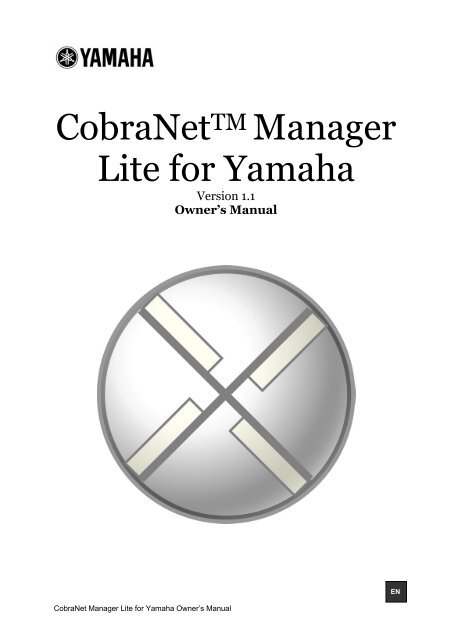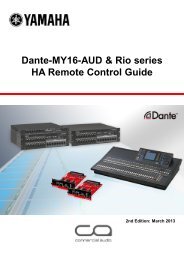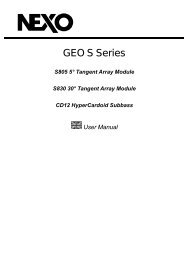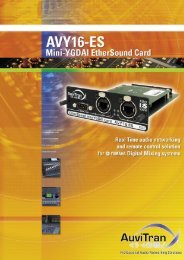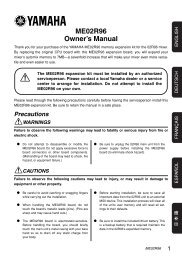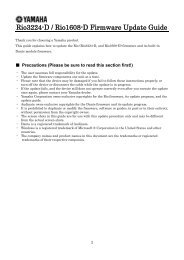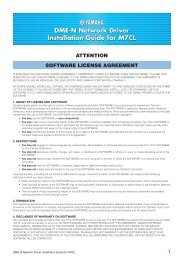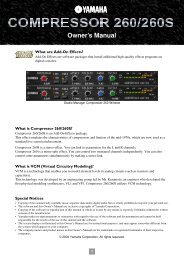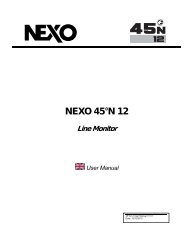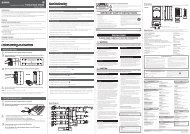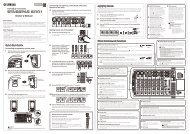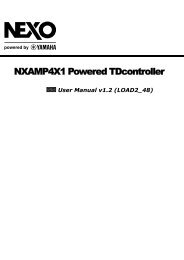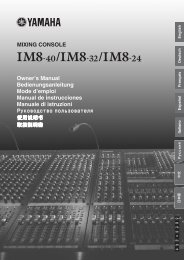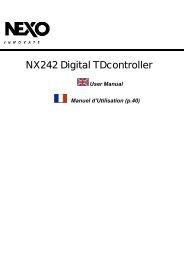CobraNet Manager Lite for Yamaha Owner's Manual
CobraNet Manager Lite for Yamaha Owner's Manual
CobraNet Manager Lite for Yamaha Owner's Manual
You also want an ePaper? Increase the reach of your titles
YUMPU automatically turns print PDFs into web optimized ePapers that Google loves.
<strong>CobraNet</strong> TM <strong>Manager</strong><br />
<strong>Lite</strong> <strong>for</strong> <strong>Yamaha</strong><br />
Version 1.1<br />
Owner’s <strong>Manual</strong><br />
<strong>CobraNet</strong> <strong>Manager</strong> <strong>Lite</strong> <strong>for</strong> <strong>Yamaha</strong> Owner’s <strong>Manual</strong><br />
EN
Table of contents<br />
1. Setup Guide....................................................................................................................... 4<br />
1.1. Connections................................................................................................................ 4<br />
1.2. <strong>CobraNet</strong> <strong>Manager</strong> Startup and Initial Settings ......................................................... 5<br />
1.3. Select an MY16-CII to be Set Up from the <strong>CobraNet</strong> <strong>Manager</strong>................................ 8<br />
1.4. MY16-CII Bundle Settings ........................................................................................ 9<br />
2. MY16-CII Device Settings............................................................................................. 16<br />
2.1. MY16-CII Serial Control and Latency Settings....................................................... 17<br />
2.2. Advanced MY16-CII Settings.................................................................................. 18<br />
2.3. Clock Synchronization Mode................................................................................... 20<br />
Introduction<br />
<strong>CobraNet</strong> <strong>Manager</strong> <strong>Lite</strong> <strong>for</strong> <strong>Yamaha</strong> (<strong>CobraNet</strong> <strong>Manager</strong>) allows MY16-CII related <strong>CobraNet</strong><br />
parameters such as bundle numbers to be displayed and edited. The MY16-CII is the only<br />
<strong>Yamaha</strong> product supported by this software. Unsupported products will be displayed, but cannot<br />
be controlled or edited. Please be sure to only use the <strong>CobraNet</strong> <strong>Manager</strong> when one or more<br />
MY16-CII cards are online.<br />
This manual describes procedures <strong>for</strong> using the <strong>CobraNet</strong> <strong>Manager</strong> with the MY16-CII. Further<br />
details about the software can be found in the “D&R <strong>CobraNet</strong> <strong>Manager</strong> <strong>Lite</strong> User <strong>Manual</strong>”.<br />
<strong>CobraNet</strong> <strong>Manager</strong> <strong>Lite</strong> <strong>for</strong> <strong>Yamaha</strong> Owner’s <strong>Manual</strong> 2
Special Notices<br />
● This software is the exclusive copyright of D&R.<br />
● Use of the software and this manual is governed by the Software Licensing Agreement which<br />
the purchaser fully agrees to upon breaking the seal of the software packaging. (Carefully read<br />
the agreement at the end of the MY16-CII owner’s manual be<strong>for</strong>e installing the software.)<br />
● Copying of the software or reproduction of this manual in whole or in part by any means is<br />
expressly <strong>for</strong>bidden without the written consent of the manufacturer.<br />
● <strong>Yamaha</strong> makes no representations or warranties with regard to the use of the software and<br />
documentation and cannot be held responsible <strong>for</strong> the results of the use of this manual and the<br />
software.<br />
● This disc is a CD-ROM. Do not attempt to play the disc on an audio CD player. Doing so may<br />
result in irreparable damage to your audio system.<br />
● The screen displays as illustrated in this manual are <strong>for</strong> instructional purposes, and may appear<br />
somewhat different from the screens which appear on your computer.<br />
● Future upgrades of application and system software and any changes in specifications and<br />
functions will be announced separately.<br />
● Specifications and descriptions in this owner’s manual are <strong>for</strong> in<strong>for</strong>mation purposes only.<br />
<strong>Yamaha</strong> Corp. reserves the right to change or modify specifications at any time without prior<br />
notice. Since specifications may not be the same in every locale, please check with your <strong>Yamaha</strong><br />
dealer.<br />
● The company names and product names in this owner’s manual are the trademarks or<br />
registered trademarks of their respective companies.<br />
<strong>CobraNet</strong> <strong>Manager</strong> <strong>Lite</strong> <strong>for</strong> <strong>Yamaha</strong> Owner’s <strong>Manual</strong> 3
1. Setup Guide<br />
In order to use the MY16-CII it is first necessary to set the appropriate bundle number and other<br />
<strong>CobraNet</strong> parameters. This section will describe the procedure <strong>for</strong> using the <strong>CobraNet</strong> <strong>Manager</strong><br />
to make the initial <strong>CobraNet</strong> settings <strong>for</strong> the MY16-CII.<br />
Note: Use the following methods to set up <strong>CobraNet</strong> devices other than the MY16-CII:<br />
・ Use the DME Designer software to set up the DME8i-C/DME8o-C/DME4io-C.<br />
・ Use the NetworkAmp <strong>Manager</strong> software to set up the ACU16-C/NHB32-C.<br />
・ Use the on-board rotary switches to set up the MY16-C.<br />
Or use the setup facilities provided <strong>for</strong> devices not listed above.<br />
1.1. Connections<br />
Begin by making the connections illustrated below in order to set up the <strong>CobraNet</strong> parameters<br />
using the <strong>CobraNet</strong> <strong>Manager</strong>.<br />
These connections are made specifically to set up the <strong>CobraNet</strong> parameters, and can be<br />
changed later to suit system requirements.<br />
Example 1: Simultaneous Setup of Multiple MY16-CII cards<br />
The switching hub to which the MY16-CII cards are connected is connected to the computer via<br />
an Ethernet straight cable.<br />
Switching Hub<br />
Computer<br />
Ethernet Straight Cable<br />
Figure 1: Connection Example 1<br />
<strong>CobraNet</strong> <strong>Manager</strong> <strong>Lite</strong> <strong>for</strong> <strong>Yamaha</strong> Owner’s <strong>Manual</strong> 4
Example 2: Setting Up a Single MY16-CII card<br />
Directly connect the MY16-CII card to the computer via an Ethernet cross cable. Alternatively,<br />
connect via a switching hub and connect the hub to the computer via an Ethernet straight cable.<br />
Ethernet Cross Cable<br />
Switching Hub<br />
Ethernet Straight Cable<br />
Computer Computer<br />
Figure 2: Connection Example 2<br />
1.2. <strong>CobraNet</strong> <strong>Manager</strong> Startup and Initial Settings<br />
Once the computer and MY16-CII have been connected, from the [Start] menu click [All<br />
Programs] -> [<strong>CobraNet</strong> <strong>Manager</strong> <strong>Lite</strong> <strong>Yamaha</strong> V1.1] to launch the <strong>CobraNet</strong> <strong>Manager</strong>.<br />
The “Preferences” window shown below will appear the first time you launch the <strong>CobraNet</strong><br />
<strong>Manager</strong>. Follow the procedure outlined below to make the initial settings.<br />
Figure 3: “Preferences” Window<br />
<strong>CobraNet</strong> <strong>Manager</strong> <strong>Lite</strong> <strong>for</strong> <strong>Yamaha</strong> Owner’s <strong>Manual</strong> 5
Note: The “Preferences” window can be opened after the <strong>CobraNet</strong> <strong>Manager</strong> has been launched<br />
by selecting [General Preferences] from the [Setup] menu.<br />
Network Adaptor Setup<br />
1. Select the network adaptor (primary network) connected to the MY16-CII from the “Select<br />
primary network adaptor” selection box.<br />
2. Select “None” or a secondary network (a backup network that will take over if the primary<br />
network connection is interrupted) adaptor from the “Select secondary network adaptor”<br />
selection box.<br />
Note: The <strong>CobraNet</strong> <strong>Manager</strong> can be used even if secondary network is not selected. Be sure to<br />
select “None” if no secondary network will be used.<br />
IP Address Setup<br />
In order to set the bundle number and other <strong>CobraNet</strong> parameters using the <strong>CobraNet</strong> <strong>Manager</strong>,<br />
it is necessary to assign IP addresses to the MY16-CII cards. The <strong>CobraNet</strong> <strong>Manager</strong> has a<br />
function that will automatically assign IP numbers, which can normally be used as follows.<br />
Note: It is not necessary to assign IP addresses if the <strong>CobraNet</strong> <strong>Manager</strong> will not be used.<br />
1. The range over which IP address will be automatically assigned is specified by the “IP<br />
Range Start” and “IP Range End” parameters. IP addresses having the same network<br />
address as the computer but different host addresses will be assigned.<br />
Note: The first time the <strong>CobraNet</strong> <strong>Manager</strong> is launched the IP address range is automatically set<br />
based on the computer’s IP address (network address and host address). If these settings are<br />
acceptable they do not need to be changed.<br />
Note: Be sure that the specified IP address range does not include the computer’s own IP<br />
address.<br />
If the computer IP address is 192.168.0.1 and the subnet mask is 255.255.255.0<br />
IP Range Start 192.168.0.2<br />
IP Range End 192.168.0.253<br />
If the computer IP address is 172.16.0.1 and the subnet mask is 255.255.0.0<br />
IP Range Start 172.16.0.2<br />
IP Range End 172.16.254.253<br />
<strong>CobraNet</strong> <strong>Manager</strong> <strong>Lite</strong> <strong>for</strong> <strong>Yamaha</strong> Owner’s <strong>Manual</strong> 6
2. Check the “Assign IP automatically to <strong>CobraNet</strong> devices” checkbox.<br />
Note: The IP address that was assigned automatically is retained even if the power is turned off.<br />
Moreover, IP addresses cannot be automatically re-assigned to the MY16-CII cards that already<br />
have their own IP addresses. If you want to assign IP addresses manually, refer to page 15.<br />
This completes setup <strong>for</strong> automatic assignment of IP addresses to MY16-CII cards.<br />
Community String Setup<br />
The “Default read community” should be set to “public”, and the “Default write community” to<br />
“private”. These are the default settings when the <strong>CobraNet</strong> <strong>Manager</strong> is initially launched, so they<br />
do not need to be changed.<br />
Completion of Initial Setup<br />
The above settings make it possible to control MY16-CII cards from the <strong>CobraNet</strong> <strong>Manager</strong>.<br />
Click [OK] to close the “Preferences” window.<br />
<strong>CobraNet</strong> <strong>Manager</strong> <strong>Lite</strong> <strong>for</strong> <strong>Yamaha</strong> Owner’s <strong>Manual</strong> 7
1.3. Select an MY16-CII to be Set Up from the <strong>CobraNet</strong> <strong>Manager</strong><br />
1. When the “Preferences” window is closed the “Select Devices” window will open.<br />
Note: The “Select Devices” window will open automatically first instead of the “Preferences”<br />
window from the second time the <strong>CobraNet</strong> manager is launched onward.<br />
Figure 4: Select Devices Window<br />
The MAC addresses of MY16-CII currently connected to the network will appear in the left list<br />
(“Online Devices”). If IP address is assigned, MAC addresses, device names and location will be<br />
displayed.<br />
Note: Nothing will appear in the list if the <strong>CobraNet</strong> <strong>Manager</strong> is offline. In such a case click the<br />
[Close] button to close the window, then turn on the Online switch in the lower right area of the<br />
main window.<br />
2. Double-click the device you want to access in the “Online Devices” list (the left list) to<br />
move that device to the “Selected Devices” list (the right list).<br />
Note: The <strong>Lite</strong> version of this software can manage a maximum of four devices simultaneously.<br />
The full version has no limit to the number of devices that can be managed. Refer to the<br />
<strong>CobraNet</strong> <strong>Manager</strong> website <strong>for</strong> details.<br />
http://www.cobranetmanager.com<br />
3. Click the [Close] button to close the “Select Devices” window.<br />
<strong>CobraNet</strong> <strong>Manager</strong> <strong>Lite</strong> <strong>for</strong> <strong>Yamaha</strong> Owner’s <strong>Manual</strong> 8
1.4. MY16-CII Bundle Settings<br />
When the “Select Devices” window is closed the main window – like the one shown below – will<br />
appear. This is the Matrix View window. Make the required MY16-CII bundle settings as<br />
described below.<br />
Device Names<br />
Figure 5: Matrix View<br />
The <strong>CobraNet</strong> <strong>Manager</strong> allows individual names to be assigned to each device. When using<br />
multiple MY16-CII cards, be sure to give each card a different name to facilitate identification. The<br />
name assigned here will be displayed in the “Select Devices” and “Matrix View” windows.<br />
1. Right click on a Tx or Rx block on the border of the Matrix View window to open the pop-up<br />
menu shown below.<br />
Figure 6: Matrix View Pop-up Menu<br />
<strong>CobraNet</strong> <strong>Manager</strong> <strong>Lite</strong> <strong>for</strong> <strong>Yamaha</strong> Owner’s <strong>Manual</strong> 9
2. Select “Device Properties” to open the “Device properties” window.<br />
Figure 7: Device Properties Window<br />
3. To refresh the display to show the current MY16-CII settings click [Get in<strong>for</strong>mation from<br />
device].<br />
4. Edit the name in the “Global” section “Name” field.<br />
Note: To identify the MY16-CII card between individual cards, please check the MAC address<br />
displayed in the “Global” section “MAC” field with that labeled on the card panel.<br />
5. Click [Store] to apply and save the new name.<br />
Note: If the new name cannot be saved, the IP address might not be assigned properly (see<br />
page 15).<br />
<strong>CobraNet</strong> <strong>Manager</strong> <strong>Lite</strong> <strong>for</strong> <strong>Yamaha</strong> Owner’s <strong>Manual</strong> 10
Bundle Numbers<br />
Set the appropriate bundle numbers using one of the methods described below to allow transfer<br />
of audio signals between transmitting and receiving devices.<br />
� Connecting Multiple MY16-CII Cards Only via Matrix View<br />
This method selects the bundle numbers automatically and is only useful <strong>for</strong> setting up bundles<br />
that will be transmitted and received between the MY16-CII cards displayed in the Matrix View.<br />
1. Click on the Matrix View to create a connection or “point,” as described below.<br />
When a connection is created, bundle numbers are set <strong>for</strong> the transmitting and receiving<br />
devices, allowing audio signal transfer. “Tx” is the transmit bundle and “Rx” is the receive<br />
bundle. The numbers following Tx or Rx are the socket numbers that indicate the order of<br />
the transmit and receive bundles.<br />
When a new connection point is created, unicast bundles (black lines) are specified by default.<br />
Note: Audio signals cannot be transferred if the latencies of the transmitting and receiving<br />
devices differ. Set the same latency <strong>for</strong> both devices via the “<strong>Yamaha</strong> Device Settings” window<br />
(page 16).<br />
Figure 8: Matrix View<br />
<strong>CobraNet</strong> <strong>Manager</strong> <strong>Lite</strong> <strong>for</strong> <strong>Yamaha</strong> Owner’s <strong>Manual</strong> 11
2. To change a connection to multicast or multi-unicast bundles, click on the vertical line that<br />
goes through the target connection point to open the bundle type editing window.<br />
Note: Unicast bundles are only transmitted to single devices which have been set to the same<br />
bundle number as the transmitting device. Multicast bundles are transmitted to all devices on the<br />
network regardless of their settings, but only bundles with the specified bundle number(s) are<br />
processed. For this reason, multicast bundles make heavy use of network bandwidth and it is<br />
recommended that the maximum number of multicast bundles be limited to 4 (32 channels).<br />
Multi-unicast bundles are only transmitted to up to four devices simultaneously, saving network<br />
bandwidth compared to multicast bundles.<br />
Figure 9: Bundle type editing window<br />
3. Click “Multicast” to change the connection to multicast, or “Multi-unicast” to change the<br />
connection to multi-unicast.<br />
This completes MY16-CII bundle setup. The MY16-CII can now be used <strong>for</strong> audio signal transfer.<br />
For in<strong>for</strong>mation on setting MY16-CII latency and other detailed settings skip ahead to “2. MY16-<br />
CII Device Settings” on page 16.<br />
� Connecting MY16-CII Cards and Other <strong>CobraNet</strong> Devices via the Device Properties<br />
Window<br />
Bundle numbers can be set if the system includes devices not directly supported by the <strong>CobraNet</strong><br />
<strong>Manager</strong> (such as the MY16-C) by using the procedure described below.<br />
1. Right click on a Tx or Rx block on the border of the Matrix View window to open the pop-<br />
up menu shown below.<br />
<strong>CobraNet</strong> <strong>Manager</strong> <strong>Lite</strong> <strong>for</strong> <strong>Yamaha</strong> Owner’s <strong>Manual</strong> 12
Figure 10: Matrix View Pop-up Menu<br />
2. Select “Device Properties” to open the “Device properties” window.<br />
Figure 11: Device Properties Window<br />
3. Click the tab corresponding to the Rx or Tx socket you want to set in the “Sockets”<br />
section in the lower area of the window.<br />
Figure 12: Sockets Section<br />
4. Enter the bundle number in the “Bundle” field and click the [Set Socket] button.<br />
<strong>CobraNet</strong> <strong>Manager</strong> <strong>Lite</strong> <strong>for</strong> <strong>Yamaha</strong> Owner’s <strong>Manual</strong> 13
Note: Don’t change the value in the Tx “Ch” field. The communication load can be reduced by<br />
changing this parameter, but some audio channels will become inoperative. To reduce the<br />
communication load without disabling the audio channels, edit the “Channels per Bundle”<br />
parameter in the “<strong>Yamaha</strong> Device Settings” window (page 18).<br />
5. To refresh the display to show the current device settings click [Get in<strong>for</strong>mation from<br />
device].<br />
6. Make sure that the “Persistence on” checkbox is checked.<br />
Note: When “Persistence on” is checked the <strong>CobraNet</strong> settings are retained even when the<br />
power is turned off. If this checkbox is unchecked the settings will be initialized when the power is<br />
turned off.<br />
This completes MY16-CII bundle setup. The MY16-CII can now be used <strong>for</strong> audio signal transfer.<br />
For in<strong>for</strong>mation on setting MY16-CII latency and other detailed settings refer to “2. MY16-CII<br />
Device Settings” on page 16.<br />
<strong>CobraNet</strong> <strong>Manager</strong> <strong>Lite</strong> <strong>for</strong> <strong>Yamaha</strong> Owner’s <strong>Manual</strong> 14
If Cannot Change Device Name and Bundle Numbers<br />
If the device name and bundle numbers cannot be changed, the IP address might not be<br />
assigned properly. Moreover, IP addresses cannot be automatically re-assigned to the MY16-CII<br />
cards that already have their own IP addresses. If you want to assign IP addresses manually,<br />
follow the procedure below.<br />
1. Right click on a Tx or Rx block on the border of the Matrix View window to open the pop-<br />
up menu shown below.<br />
Figure 13: Matrix View Pop-up Menu<br />
2. Select “Device Properties” to open the “Device properties” window.<br />
Figure 14: “Device Properties” Window<br />
3. Right-click the IP address, and select “Get Free IP” from the pop-up menu to assign a<br />
tentative IP address.<br />
4. Right-click the IP address, select “Assign if static IP” (Assign as static IP address which is<br />
retained even after the power is turned off) or “Assign if current IP” (Assign as temporary<br />
IP address), then enter the desired IP address.<br />
5. Click [Store] to apply and save the new IP address.<br />
<strong>CobraNet</strong> <strong>Manager</strong> <strong>Lite</strong> <strong>for</strong> <strong>Yamaha</strong> Owner’s <strong>Manual</strong> 15
2. MY16-CII Device Settings<br />
This version of the <strong>CobraNet</strong> <strong>Manager</strong> is optimized <strong>for</strong> operation with the <strong>Yamaha</strong> MY16-CII. For<br />
this reason it incorporates some special features that provide optimum compatibility with the<br />
MY16-CII. Parameters specific to the MY16-CII can be accessed via the Matrix View window as<br />
well as the device overview window.<br />
CAUTION!<br />
The SNMP indicator may remain lit while large volumes of data are being transferred. Wait<br />
<strong>for</strong> the SNMP indicator to go out be<strong>for</strong>e making further parameter changes. Attempting to<br />
make new changes be<strong>for</strong>e the previous data has been fully transferred can result in<br />
erroneous operation.<br />
When you right click on the matrix border at a location corresponding to an MY16-CII, the popup<br />
menu will contain an additional “YAMAHA Device Settings” item.<br />
Figure 15: <strong>Yamaha</strong> Device Settings from the Matrix View<br />
Similarly, if you right click on an MY16-CII in the device overview window the popup menu will<br />
contain an additional “YAMAHA Device Settings” item.<br />
Figure 16: <strong>Yamaha</strong> Device Settings from the Device Overview Window<br />
Selecting the “YAMAHA Device Settings” item brings up a new window that contains a number of<br />
parameters that are specific to the MY16-CII.<br />
<strong>CobraNet</strong> <strong>Manager</strong> <strong>Lite</strong> <strong>for</strong> <strong>Yamaha</strong> Owner’s <strong>Manual</strong> 16
2.1. MY16-CII Serial Control and Latency Settings<br />
Figure 17: <strong>Yamaha</strong> Device Settings Window<br />
Roll your cursor over the Rx or Tx field to see an edit box that allows you to select a serial<br />
channel to be used <strong>for</strong> reception or transmission. Use the up and down arrow buttons on the right<br />
side of the edit box to select the desired channel. The available range is OFF or 1-15. Data<br />
transfer becomes possible when the channels of the transmitting and receiving devices are<br />
matched. No transmission or reception takes place when OFF is selected.<br />
Hint: As an example, serial control is used <strong>for</strong> remotely controlling a DME64N from the PM5D.<br />
Figure 18: Rx/Tx Serial channel edit box<br />
Click on the “Bit Length” field to change the audio bit length to be transferred via the <strong>CobraNet</strong><br />
network. A popup menu will appear allowing you to select “Bit Off”, “16bit”, “20bit”, or “24bit”.<br />
Figure 19: Bit Length popup menu<br />
<strong>CobraNet</strong> <strong>Manager</strong> <strong>Lite</strong> <strong>for</strong> <strong>Yamaha</strong> Owner’s <strong>Manual</strong> 17
Click on the “Latency” field to change latency mode <strong>for</strong> audio data transferred via the <strong>CobraNet</strong><br />
network. A popup menu will appear allowing you to select “5.33ms”, “2.67ms”, or “1.33ms”.<br />
Note that latency of transmitter and receiver must be the same to transmit audio data.<br />
Figure 20: Latency popup menu<br />
Click the [Advanced] button to bring up a second window containing the advanced settings.<br />
Note: If MY16-CII settings are changed from a source other than the <strong>CobraNet</strong> <strong>Manager</strong> while<br />
the “<strong>Yamaha</strong> Device Settings” or “Advanced Settings” window is open, the <strong>CobraNet</strong> <strong>Manager</strong><br />
displays will not be updated to reflect those changes. Click the [Get in<strong>for</strong>mation from device]<br />
button in the “Device Properties” window to refresh the display and show the current settings.<br />
2.2. Advanced MY16-CII Settings<br />
Figure 21: “Advanced Settings” window<br />
Click on the “Channel per Bundle” Input or Output field to bring up a popup menu that allows you<br />
to specify the channel configuration of the MY16-CII.<br />
<strong>CobraNet</strong> <strong>Manager</strong> <strong>Lite</strong> <strong>for</strong> <strong>Yamaha</strong> Owner’s <strong>Manual</strong> 18
Figure 22: Channel per Bundle popup menu<br />
The MY16-CII handles input and output of up to 16 monaural audio channels. Up to 8 input<br />
bundles and 4 output bundles can be used.<br />
Note: For in<strong>for</strong>mation on the “Conductor Priority” setting, refer to “2.3. Clock Synchronization<br />
Mode”.<br />
Figure 23: Initialization of all parameters<br />
The “Initialization of All Parameters” [Execute] button will reset all of the MY16-CII’s <strong>CobraNet</strong><br />
parameters back to their default values. This means that the MY16-CII will not be connected to<br />
the <strong>CobraNet</strong> network until the receive and transmit sockets are reconfigured. All <strong>CobraNet</strong><br />
settings will be initialized, including those that cannot be accessed via <strong>Yamaha</strong> Device Settings.<br />
<strong>CobraNet</strong> <strong>Manager</strong> <strong>Lite</strong> <strong>for</strong> <strong>Yamaha</strong> Owner’s <strong>Manual</strong> 19
2.3. Clock Synchronization Mode<br />
Like the MY16-C, the MY16-CII provides three clock synchronization modes: Network Sync, Host<br />
Sync 1, and Host Sync 2. The clock synchronization mode is automatically selected according to<br />
the word clock status of the host device into which the MY16-CII is installed.<br />
If the device into which the MY16-CII is installed receives its clock signal from the MY16-CII, the<br />
MY16-CII will operate in Network Sync mode.<br />
MY16-CII<br />
PM5D etc<br />
Clock<br />
Network Sync<br />
Figure 24: Network Sync<br />
If the device into which the MY16-CII is installed receives its clock signal from an external device<br />
which is not part of the <strong>CobraNet</strong> network, the MY16-CII will operate in Host Sync 1 mode.<br />
Device external to<br />
<strong>CobraNet</strong> network<br />
MY16-CII<br />
PM5D etc<br />
Clock<br />
Host Sync 1<br />
Figure 25: Host Sync 1<br />
If two or more MY16-CII cards are installed in the same host device, and the host device receives<br />
its clock signal from one of those MY16-CII cards, all other MY16-CII cards that receive their<br />
clock signal from the host will operate in Host Sync 2 mode.<br />
<strong>CobraNet</strong> <strong>Manager</strong> <strong>Lite</strong> <strong>for</strong> <strong>Yamaha</strong> Owner’s <strong>Manual</strong> 20
MY16-CII<br />
PM5D etc<br />
Clock<br />
MY16-CII<br />
Figure 26: Host Sync 2<br />
Host Sync 2<br />
Note: In this case the MY16-CII card that is supplying the clock signal to the host device is<br />
operating in Network Sync mode.<br />
Conductor Priority Settings<br />
"Conductor Priority" is a setting related to the Network Sync mode. The “Conductor Priority” filed<br />
is located at the center of “MY16-CII Advanced Settings” window. Roll your cursor over this field<br />
to see an edit box via which you can specify conductor priority by using the up and down buttons<br />
on the right side of the box.<br />
Auto:<br />
Figure 27: Conductor priority edit box<br />
The appropriate conductor priority will be set according to the MY16-CII clock synchronization<br />
mode. Use this mode unless you need to set a specific device as the <strong>CobraNet</strong> conductor.<br />
0-255:<br />
Specifies a fixed conductor priority. A fixed conductor priority setting can be used when a specific<br />
device is to be assigned as the <strong>CobraNet</strong> conductor.<br />
Auto Conductor Priority Value<br />
When the conductor priority setting is “Auto”, the conductor priority is set according to the<br />
synchronization mode, as follows.<br />
MY16-CII Sync Mode Conductor Priority<br />
Network Sync 32<br />
Host Sync 1 128<br />
Host Sync 2 0<br />
<strong>CobraNet</strong> <strong>Manager</strong> <strong>Lite</strong> <strong>for</strong> <strong>Yamaha</strong> Owner’s <strong>Manual</strong> 21
Note: When Conductor Priority is set to a value other than “Auto”, the value specified via the<br />
<strong>CobraNet</strong> <strong>Manager</strong> takes priority.<br />
Note: The MY16-C conductor priority is automatically set to the same values as the MY16-CII<br />
according to the three available clock modes, but the MY16-C conductor priority setting cannot be<br />
changed manually.<br />
Conductor Priority Should Be Set <strong>Manual</strong>ly When...<br />
With some types of connection, word clock loops may occur when Conductor Priority is set to<br />
“Auto” resulting in network instability. In such cases set conductor priority to prevent the<br />
occurrence of loops.<br />
<strong>CobraNet</strong> device<br />
MY16-CII<br />
PM5D<br />
Network Sync<br />
per<strong>for</strong>mer<br />
Figure 28: Conductor Priority needs to be set manually<br />
In this example Conductor Priority is set to “Auto” so the MY16-CII installed in the DME64N<br />
becomes a conductor and a word clock loop is created. To rectify this problem it is necessary to<br />
either lower the conductor priority of the MY16-CII installed in the DME64 or raise the conductor<br />
priority of the MY16-CII installed in the PM5D, thus preventing the MY16-CII installed in the<br />
DME64N from functioning as conductor.<br />
Network<br />
<strong>CobraNet</strong> Synchronization signal flow<br />
Clock<br />
MY16-CII<br />
DME64N<br />
Host Sync 1<br />
conductor<br />
U.R.G.,Pro Audio& Digital Musical Instrument Division, <strong>Yamaha</strong> Corporation<br />
©2006 <strong>Yamaha</strong> Corporation<br />
<strong>CobraNet</strong> <strong>Manager</strong> <strong>Lite</strong> <strong>for</strong> <strong>Yamaha</strong> Owner’s <strong>Manual</strong> 22<br />
B0


